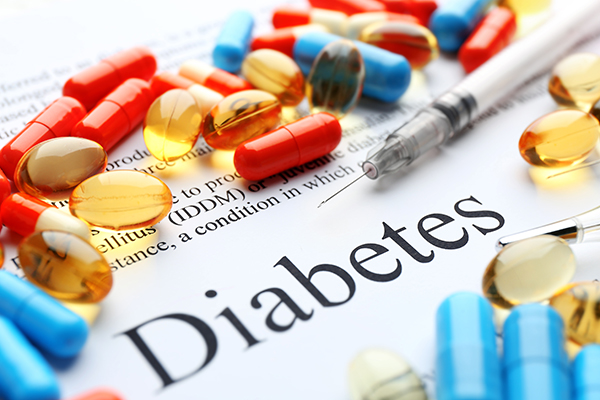
The study, conducted by researchers at the Institute of Health Metrics and Evaluation (IHME) at the University of Washington, found that there are currently 529 million people in the world with diabetes – with the majority of the cases being Type 2 diabetes (T2D) – the form of the disease that is linked to obesity and is largely preventable. They projected that this will more than double to around 1.3 billion people by 2050.
Why the prevalence of diabetes is increasing
"We have been unable to stem the tide of diabetes on a population basis throughout the world as well as in the United States – even though we have the knowledge and the tools to do it, [including identifying] those at risk well before the disease manifests," Dr. Florence Comite, a multiple-specialty endocrinologist told Health. (Related: Diabetes skyrockets 75% in just one decade… medical system clueless about answers.)
Within the Global Burden of Disease (GBD) study, the researchers looked at 16 factors that have been associated with T2D and found that obesity is the main risk factor in every country, said Dr. Liane Ong, first author on the study and lead research scientist at the IHME.
The study authors also noted that major behavioral shifts and changes in food systems could be contributing to the increase. They indicated that the greater availability of shelf-stable and high-calorie products, limited financial means and limited access to healthy food options could be playing a role, too.
Diabetes growth is definitely multi-factorial, said New York University Langone Health endocrinologist Dr. Michael B. Natter, who isn't part of the study. Although the leading cause behind this increase is likely related to obesity, he noted that sedentary lifestyles, an aging population and genetic underpinnings may also play a role.
Lack of quality sleep and increased stress are also correlated with higher blood sugar and diabetes, and both can elevate the hormone cortisol. Chronically high cortisol levels over time can lead to increased glucose levels, Natter added.
Moreover, even the Wuhan coronavirus disease (COVID-19) could play a role in increasing numbers due to the fact that the virus tends to latch on to ACE2 receptors, Natter said, citing a study published in the journal Diabetes, Obesity and Metabolism, which found that 14.4 percent of people who were hospitalized with severe COVID-19 also developed diabetes.
Tips for preventing and managing T2D
The good news is that people diagnosed with T2D – particularly those with pre-diabetes – can potentially reverse the condition by losing weight, improving their diet, getting better sleep and de-stressing, according to both Comite and Natter.
Even if the number of diabetes cases does increase, not all is lost. There are things that can be done to improve the outcomes.
Make smart food choices
Follow the general guidelines for a healthful diet – lots of low glycemic (low sugar) vegetables and fruits, whole grains, lean proteins, fiber and healthy fats like olive oil, avocado and fatty fish.
Start meals with lean protein, which digests slower than carbs and will reduce the impact of carbs later in the meal. Avoid sugary beverages and processed carbs like baked goods, bread and pasta that are low or devoid of dietary fiber as they will raise sugar levels.
Be especially wary of foods made with high-fructose corn syrup. Drink water as a primary beverage.
Exercise regularly
Reduce body weight and visceral fat by moving more throughout the day, adding in exercise and cutting back on sedentary behaviors.
Walking or biking or rowing or gardening and even housework and sex are great exercises. Add HIIT (High-Intensity Interval Training), which is as simple as a few sprints lasting 30 to 60 seconds, and shoot for at least 30 minutes a day at a moderate to brisk pace.
Try to incorporate resistance exercises, like bodyweight calisthenics, weightlifting, functional training or use resistance bands to build muscle, which improves glucose control.
Practice quality sleep habits
Sleeping does not only provide the body with much-needed rest. It also restores the immune system, regulates hormones that control sugar management and switches on genes that repair and build muscle, which is important for metabolic health.
Cope with diabetes distress
Having diabetes can be overwhelming – worrying about having low or high blood sugar levels, the cost of medicines and developing diabetes-related complications, such as heart disease or nerve damage. It’s important to pay attention to emotions such as frustration and tiredness and take action to address them immediately.
One need not rush reaching their diabetes goals as all things take time. Talking to family members, friends and healthcare providers can help with a person's journey toward overcoming diabetes.
Prevention tips for parents
Here are some ideas for preventing and managing diabetes that are more specific to kids.
Get more active together. Encourage playing outside, trips to the park, walking the dog or games between siblings. Facilitate family walks or hikes so that everyone stays active together and nobody feels singled out.
Offer nutritious snacks. Swap ultra-processed options like chips and candy for fresh fruit with nut butter, veggies with bean dip, smoothies, yogurt parfaits or whole wheat pita pizzas.
Limit screen time. Set a limit to children's daily amount of screen time, which includes sitting in front of the computer or TV. Encourage other activities like playing outside or doing arts and crafts. Eat meals as a family instead of in front of the TV.
Slowing diabetes rates on a global level
Early diagnosis, patient education, regular checkups, diagnostic tests and recognizing a family history of diabetes are essential to preventing and slowing diabetes, Comite said.
It is also important to keep in mind that while T2D can be prevented by addressing risk factors, some amount of T2D is inevitable due to natural aging, said Lauryn Stafford, the second author of the study and researcher at IHME.
"This means that as our global population ages over the next three decades, our health care systems must be prepared to detect people with diabetes through routine screening and also treat people with diabetes," she said.
Stafford emphasized that effective treatment of diabetes is essential to prevent complications and further reduce the risk of other serious conditions.
Watch Dr. Beau Ellis as he talks about diabetes in the video below.
This video is from the Dr. Beau Ellis channel on Brighteon.com.
More related stories:
Drinking coffee cuts diabetes risk in half while reducing inflammation, study shows.
Antipsychotic medications double diabetes risk in children.
Shift workers at higher diabetes risk, disrupted sleep cycles and side effects of sleep medications.
Sources include:
Please contact us for more information.




















